| Article ID | Journal | Published Year | Pages | File Type |
|---|---|---|---|---|
| 2566375 | Progress in Neuro-Psychopharmacology and Biological Psychiatry | 2007 | 8 Pages |
The present study evaluates the effect of memantine, a non-competitive N-methyl-d-aspartate (NMDA) glutamate receptor antagonist and CNQX, an alpha-amino-3-hydroxy-5-methylisoxazole-4-propionic acid (AMPA)/kainate receptor antagonist on the rewarding effects of cocaine in mice, using the conditioned place preference (CPP) paradigm. Cocaine-induced CPP was studied pairing this drug with different memantine or CNQX doses during either the acquisition or the expression phase of the procedure. Once CPP was established, and the preference extinguished, reinstatement was induced by a priming dose of cocaine. Both antagonists, which in themselves do not present motivational actions on the preference shown by the animals, abolished the acquisition and expression of the cocaine-induced CPP. Neither of the antagonists precipitated reinstatement of the preference induced by cocaine but memantine blocked the cocaine-primed reinstatement. Our results suggest that cocaine-induced CPP and reinstatement is largely dependent on glutamate neurotransmission, and confer a putative role for memantine among the tools useful for cocaine management and treatment.
